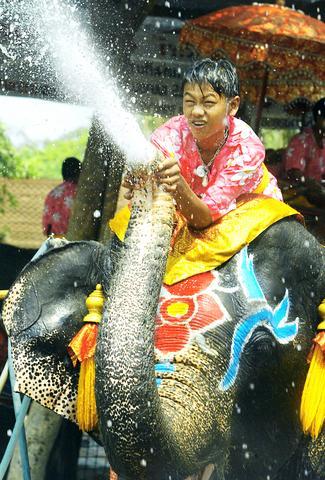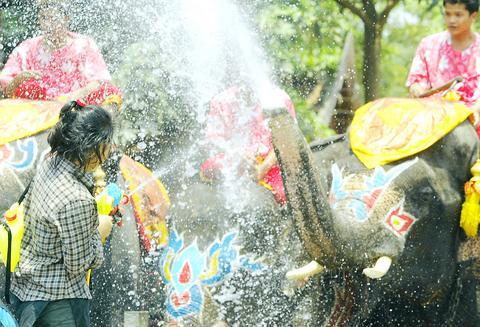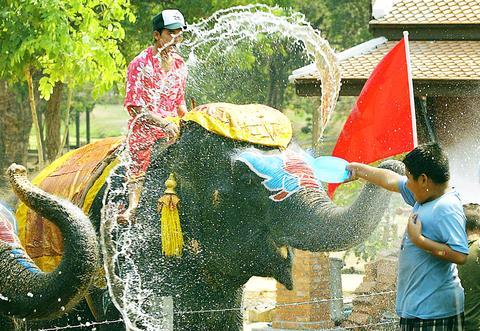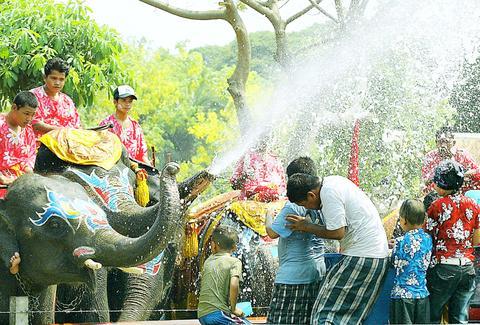Thailand, Cambodia, Myanmar and Laos today begin three days of exuberant, water-soaked celebrations marking the traditional new year, refusing to be deterred by historically low levels on the Mekong which connects them.
Water is at the heart of the mid-April festival in the four Buddhist-majority countries, signifying the washing away of sins and rancor, and refreshing the region as it is embraced by scorching summer weather.

PHOTO: REUTERS
"It will be a symbolic cleansing and washing away of sins accumulated during the old year and to prepare for the new one," a Buddhist scholar in Myanmar said of the ancient ceremony.

The water festival represents the most popular, raucous and colorful celebration of the year for more than 120 million people who will abandon any thoughts of work and bring their nations to a standstill.
Cambodia and Laos are both entering year 2548 of the Buddhist era, while Thailand will do so on Jan. 1 after adopting the Gregorian calendar. Myanmar is only passing into the year 1366 according to its numbering system.

The celebration is called Songkran in Thailand, Chaul Chnam Thmey in Cambodia, Thingyan in Myanmar and Pimai in Laos but at street corners everywhere, everyone can expect to be splashed with icy cold water.

From basic plastic buckets to high-tech pump-action water pistols which allow revellers long-range, high-precision soaking, every type of container is deployed to throw water, sometimes laced with talcum powder, colored flour, charcoal, mud and ice cubes.
City-dwellers embark on a massive exodus to the countryside for family reunions punctuated by visits to pagodas, offerings to monks, ancestor worship, traditional games and dances, sports competitions, gift-giving to parents and symbolic bathing of elders -- all to acquire "merit" in the Buddhist tradition.
The new year is also a highlight of the tourist season, for visitors who are lucky to see splendid processions of monks wrapped in saffron robes who remain composed amid the revelries in Luang Prabang, the former royal capital of Laos.
In Cambodia, small sand pagodas are built along the banks of the Mekong, while newly ordained monks are paraded on elephants deep in northern Myanmar, and music shows are staged in platforms on the rivers of northern Thailand.
The festival is also an occasion for people to wear new clothing, give Buddha statues and their houses a thorough washing, and even to donate blood.
The governor of Phnom Penh has asked residents to scrub the city clean with vast amounts of water, despite the region's drought which has helped reduce the once-mighty Mekong to a trickle in some stretches.
The effort "is to welcome the upcoming traditional Khmer New Year ... by making Phnom Penh more and more clean and create a better environment," Keb Chuktema said.
Thingyan has taken on political dimensions in Myanmar this year. As it is customary to release birds from cages at this time, many hope opposition leader Aung San Suu Kyi could be freed from house arrest at the dawn of the new year.
In Thailand, the explosive situation in the Muslim south is overshadowing Songkran. A heavy security presence has been deployed in fear that Muslim extremists who have killed 60 people this year could mount a major attack.
In all four countries, traditional New Year's day also is also well lubricated with alcohol, usually cheap local whisky or rice alcohol which fuels rampant drink-driving and carnage on the roads.
Authorities in Bangkok, Phnom Penh, Yangon and Vientiane have once again issued urgent warnings and bans to try to curb the problem.
In Thailand, where 20,000 police officers have been mobilized, blood-alcohol tests will be carried out at checkpoints. Last Songkran, more than 800 people were killed on the roads, 70 percent due to drunk-driving.
Water-throwing is prohibited after 6pm and parents have been warned they face up to three months in jail if their offspring use the festivities as an excuse to sexually harass women. The young women themselves have been asked not to wear "provocative" clothing like miniskirts.
In Myanmar, the official press noted: "It is important that people take part in the festival in line with Myanmar tradition and avoid behaviors and wearing clothes that are foreign to our culture."
In Yangon, hundred of makeshift wooden structures have been thrown up as platforms for water-throwing, especially around the capital's Inya Lake -- although revelries are banned near Aung San Suu Kyi's home.
In Cambodia, where the new year is rung in at precisely 5:36pm on Tuesday, newspapers have published official directives against "theft and other crimes, especially gambling" and security forces have been warned they will "will have to work very hard" according to a city official quoted by Cambodge Soir.
In Laos, the authorities noted that last year, "Pimai saw hundreds of people driving drunk or involved in pick-up wars which resulted in loss of life" and encouraged citizens to meet on the banks of the Mekong and leave their cars at home.

June 23 to June 29 After capturing the walled city of Hsinchu on June 22, 1895, the Japanese hoped to quickly push south and seize control of Taiwan’s entire west coast — but their advance was stalled for more than a month. Not only did local Hakka fighters continue to cause them headaches, resistance forces even attempted to retake the city three times. “We had planned to occupy Anping (Tainan) and Takao (Kaohsiung) as soon as possible, but ever since we took Hsinchu, nearby bandits proclaiming to be ‘righteous people’ (義民) have been destroying train tracks and electrical cables, and gathering in villages

Dr. Y. Tony Yang, Associate Dean of Health Policy and Population Science at George Washington University, argued last week in a piece for the Taipei Times about former president Ma Ying-jeou (馬英九) leading a student delegation to the People’s Republic of China (PRC) that, “The real question is not whether Ma’s visit helps or hurts Taiwan — it is why Taiwan lacks a sophisticated, multi-track approach to one of the most complex geopolitical relationships in the world” (“Ma’s Visit, DPP’s Blind Spot,” June 18, page 8). Yang contends that the Democratic Progressive Party (DPP) has a blind spot: “By treating any

This year will go down in the history books. Taiwan faces enormous turmoil and uncertainty in the coming months. Which political parties are in a good position to handle big changes? All of the main parties are beset with challenges. Taking stock, this column examined the Taiwan People’s Party (TPP) (“Huang Kuo-chang’s choking the life out of the TPP,” May 28, page 12), the Democratic Progressive Party (DPP) (“Challenges amid choppy waters for the DPP,” June 14, page 12) and the Chinese Nationalist Party (KMT) (“KMT struggles to seize opportunities as ‘interesting times’ loom,” June 20, page 11). Times like these can

Swooping low over the banks of a Nile River tributary, an aid flight run by retired American military officers released a stream of food-stuffed sacks over a town emptied by fighting in South Sudan, a country wracked by conflict. Last week’s air drop was the latest in a controversial development — private contracting firms led by former US intelligence officers and military veterans delivering aid to some of the world’s deadliest conflict zones, in operations organized with governments that are combatants in the conflicts. The moves are roiling the global aid community, which warns of a more militarized, politicized and profit-seeking trend